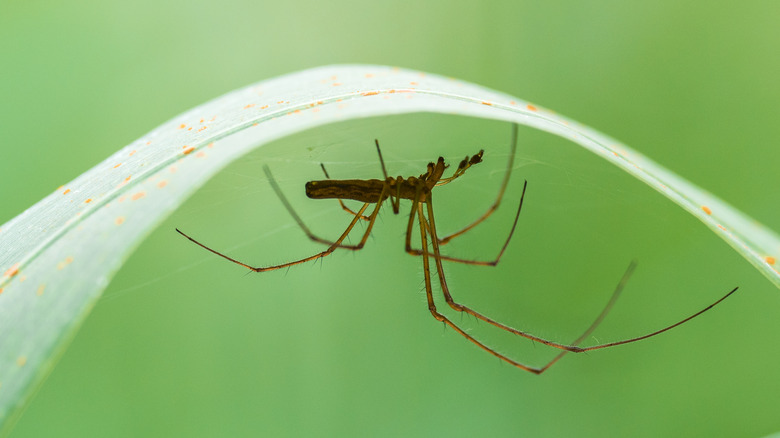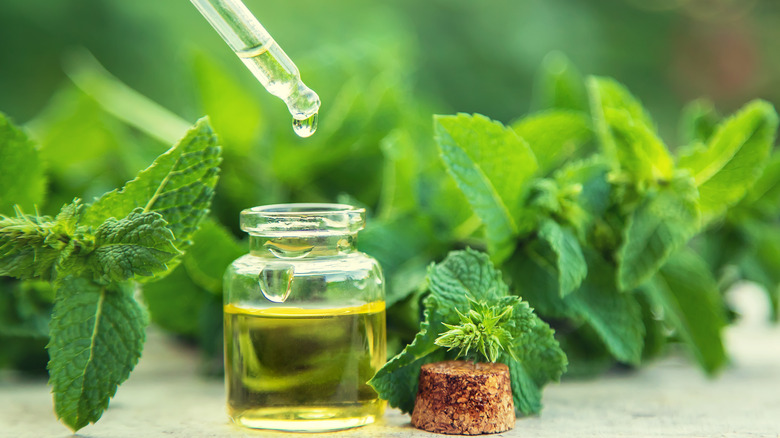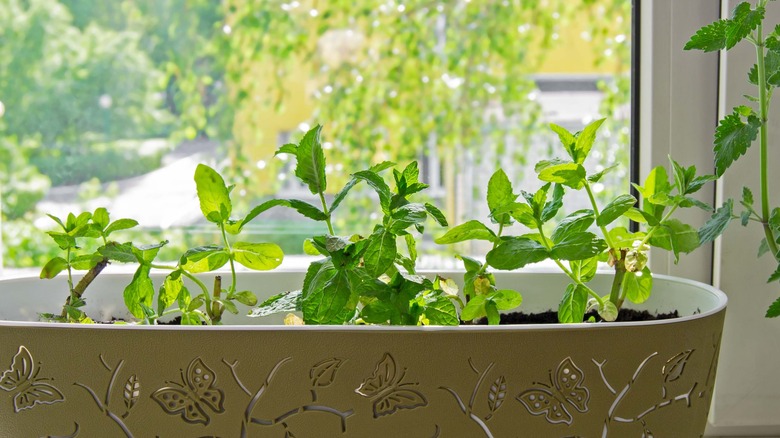Growing This Kitchen Ingredient Indoors Will Also Send Spiders Running
Among the many ingredients you might have within your kitchen, there's one you can grow that may also keep spiders away. Known for its refreshing taste and invigorating essence, the peppermint plant (or Mentha piperita) may be a natural insect repellent when grown indoors. A blend of spearmint and water mint, the highly aromatic, perennial herb emits a sharp scent through its leaves that spiders don't like. While there are various mint varieties to choose from, peppermint has the most powerful effect on the six-legged invaders because of its spicy combination of menthol, menthone, and eucalyptol.
Often planted within an outdoor herb garden, peppermint is a fairly low-maintenance plant to grow and care for inside. Whether established in a pot or planter, the lively plant can combat spiders all year round with the right amount of natural light and water. Depending on where your spiders have entered, typical areas to place peppermint plants might be within entryways and windowsills.
Peppermint's top ingredient may deter spiders
Spiders seem to dislike the fragrance of peppermint because of its main ingredient — menthol. Strong and cool, menthol is an organic substance that exists within the plant and is often made into an essential oil or tincture for beauty and household products. Although the leaves and stems contain the potent component, the greenery alone may not be enough to send spiders in the other direction. A study done in 2012 by the Entomological Society of America confirms that the aromatic plant showed no effect on spiders when planted outdoors in apple orchards. Peppermint plants may have a faint mint scent on their own, however, crushing or rubbing the leaves gives off its pure essence.
If you plan to grow peppermint indoors, you could benefit from making extracts and oils from your sprouts. Concentrated peppermint oil can keep the tiny critters on their feet when mixed with water and sprayed repeatedly throughout the house. In 2017, an article in the "Journal of Economic Entomology” found that two types of spiders avoided areas treated with peppermint oil 75% of the time. Although this method doesn't banish them forever, it's a natural way that works if done consistently.
Peppermint plants can be natural spider repellents
If you want to repel house spiders naturally, utilizing live peppermint in regularly infested areas is worth a try. Position the plants in high-traffic their areas like doorways, near windows, and vents, including any other obvious openings. You might also sprinkle the leaves in colonized corners or near cracks or gaps. How many peppermint plants will you need? Depending on the level of your spider invasion, place several where needed. Other areas of concern might be around furniture or inside closets. Additionally, you may prevent them from entering main living areas by placing peppermint in the basement or garage. Wherever you establish the zesty herb, make sure it receives a sufficient amount of sunlight and water to thrive.
Peppermint plants like full sun along with soil that is consistently moist, so water them at least every other day. With shallow roots, peppermint plants are runners and flourish in wide and shallow pots. A healthy plant will grow rapidly, as a deep container may inhibit the spreading of its lengthy stems. If growing from seed, sow them ¼ inch in depth from the surface while keeping the soil moist. Sprouts should arise within 7-14 days. Not only will growing peppermint indoors be handy for cooking and refreshments, but this kitchen ingredient is also a good approach to stop spiders from settling.


